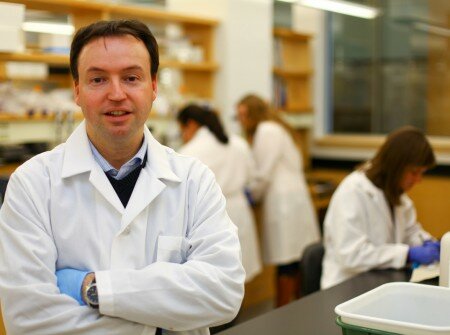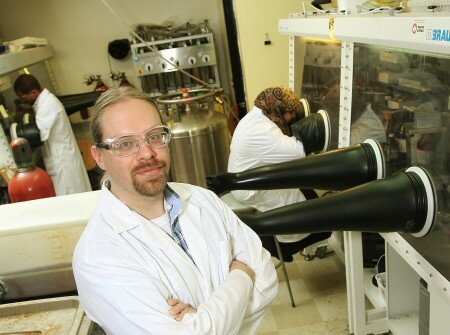 Nova Scotians who appreciate the taste of the wines coming from provincial vineyards may want to raise a glass and toast Acadia University researcher Dr. Anthony Tong.
Nova Scotians who appreciate the taste of the wines coming from provincial vineyards may want to raise a glass and toast Acadia University researcher Dr. Anthony Tong.
Working in a specialized laboratory in Acadia’s KC Irving Environmental Science Centre dedicated to investigating trace organic compounds, the talented and versatile chemistry professor spearheads numerous projects ranging from wine quality to wastewater contamination.
“The taste of wine is influenced by a number of factors such as soil quality, vintage, grape species, ripening, aging, blending, and oenological practices. Using equipment financed by the Nova Scotia Research and Innovation Trust (NSRIT) and the Canada Foundation for Innovation(CFI) we have been developing novel analytical methods for wine analysis that is helping the industry enhance wine quality.”
NSRIT and CFI helped purchase $400,000 of equipment in 2009 that was foundational to the state-of-the-art facility that added organic analysis to Acadia’s research resources, and allowed for expanded opportunities in environmental science and analytical chemistry.
“This infrastructure has been both a driver of innovation and the impetus for many new industry and academic partnerships for Acadia. This is important because of the opportunities it creates for our students as well as for our local businesses and entrepreneurs,” says Dr. Tong.
Projects tackled by his research team are in sectors as diverse as aquaculture, agriculture, and waste/wastewater management and treatment.
Another major focus of Dr. Tong’s research group has been the identification and quantification of emerging organic contaminants (EOCs). EOCs are a class of contaminants that include both naturally occurring and human-created contaminants such as Bisphenol A, Lipitor, and 2,4-D that are everyday chemicals found in personal care, cleaning and pharmaceutical products, and pesticides.
“It’s important to better understand the sources and environmental impact of EOCs, and to develop new analytical methods and protocols for EOC detection,” says Dr. Tong.
Funding support from NSERC, Environment Canada, NRC-IRAP, various student funding programs, NCE-Canadian Water Network, and Acadia, has allowed Dr.
Tong to supervise 25 students in the past seven years.








